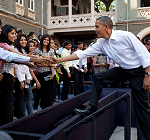When Air Force One touches down in Mumbai on Nov. 6, the U.S President will be a much weakened leader. At home, he’s facing a jobless economy with sagging growth. Abroad, he’ll be recognized as a leader who might exhibit the best of intentions without the ability to deliver on promises. His ambitious Asia tour planned months before the election, cannot look like a victory lap. He’d then be a president running from problems, at worst arrogant. So how the President conducts himself on his Indian visit will offer clues to how he might manage his next two years.
In a day or so, American voters will give their verdict in the mid-term elections and deliver their predicted “thumpin” to Barack Obama on Nov. 2. Will he lose both houses of Congress ? Will he be paralyzed for most of his second term? Or will a new Obama, a grand compromiser emerge to cut deals as President Bill Clinton did after a stinging defeat in 1994?
One thing is clear. When Air Force One touches down in Mumbai on Nov. 6, the U.S President will be a much weakened leader. At home, he’s facing a jobless economy with sagging growth. Abroad, he’ll be recognized as a leader who might exhibit the best of intentions without the ability to deliver on promises. His ambitious Asia tour planned months before the election, cannot look like a victory lap. He’d then be a president running from problems, at worst arrogant.
So how the President conducts himself on his Indian visit will offer clues to how he might manage his next two years. If events get too hot at home, it’s even conceiveable that he will cut short his visit. Polls show U.S. voters are more disaffected than even in the months before they elected Ronald Reagan. A New York Times/CBS poll says 61% believe the country is headed in the wrong direction, even though 48% in other polls say they like Obama personally.
But his 2008 mandate for change is gone. He must now see whether his Republican opposition will try to impose change of its own, attempting to repeal or gut his legislation on health care and financial reform, and snuff out any chance for reviving “cap and trade” or other “green” environmental initiatives. If he loses the Senate, which polls show less likely, he could be in “lock down” mode, facing a nasty backlash.
Playing nasty would mean Republicans launching tortuous Congressional investigations into the conduct of his admnistration. A “scorched earth” far right element led by the Tea Party is already counting on that. Moderates will caution against overplaying their hand as Republicans did during the Clinton years by temporarily shutting down government. The two-year Sexgate jihad into the personal life of Bill Clinton and Monica Lewinsky that led Republican House members to seek Clinton’s impeachment was later viewed as a mistake.
What Obama will need to do is find neutral territory. Fighting terrorism, an honorable outcome in Afghanistan, curbing North Korea and Iran’s nuclear programs, standing up to China on currency revaluation and military expansion, spotlighting global warming and keeping markets open are common ground issues.
But international business expansion and government spending are losers for the President. Some 200 U.S. corporate executives are reported to be accompanying the President to India– eager to expand in the Indian market. That kind of old style corporate politics may no longer work–it may be downright dangerous for companies to appear deaf to U.S. issues.
While India’s Bangalore bosses argue that offshoring creates jobs in the U.S., that message isn’t believed here. More than 40 U.S. candidates in the current election made China’s trade policies a target of their campaign, and at least a dozen also included India and offshoring. “I’m in favor of fair trade, not letting business shift good jobs out of the U.S,” says Democratic Congressional candidate Jim Horn, who criticised his local newspaper, the Stuart (Fl.) News, for planning to send newspaper jobs to India. Indian executives, along with other international figures, are also targets for giving back door money through the U.S. Chamber of Commerce to help Republicans. While they deny it and there is no evidence to prove they did, it’s notable that Obama’s aides surfaced the issue and have not backed off.
In previous elections, it was reasonable to expect a cooling off period before new lawmakers arrived in January, allowing Congress to work out some tradeoffs. But the Tea Party is an entirely new force in this campaign. Its 3,000 loosely affiliated groups vow to send members to State legislatures and to Washington on Nov. 3–the day after the election to watch lawmakers “like a hawk” says organizer Jim McGovern. Political pros think upstart movements like this lose financing and energy and fade after a campaign.
Maybe yes, maybe no. But they’ll be in loud voice as the President wings off for Asia.
Bob Dowling is a columnist for Century Weekly and a frequent commentator on international affairs. He was managing editor of BusinessWeek International.
This article/blog was exclusively written for Gateway House: Indian Council on Global Relations. You can read more exclusive content here.
For interview requests with the author, or for permission to republish, please contact outreach@gatewayhouse.in.
© Copyright 2010 Gateway House: Indian Council on Global Relations. All rights reserved. Any unauthorized copying or reproduction is strictly prohibited


